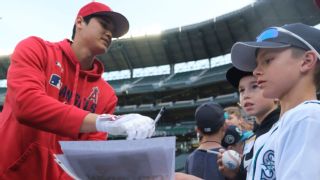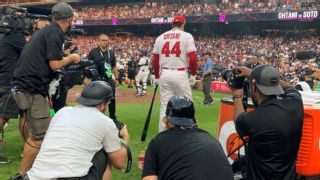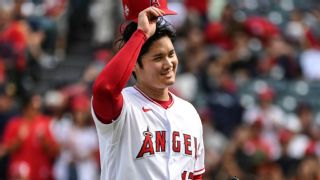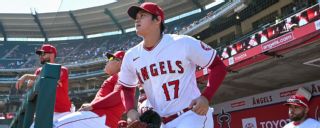|
WHEN SHOHEI OHTANI stands on the mound and stares into his catcher for a sign, his mouth is slightly open and his chin is raised just a little, giving off the impression he's every bit as curious as we are to discover what might come next. He comes set neck-high and stares somewhere over the top of the third-base dugout before his left leg rises slowly and accelerates quickly as he descends the mound and the ball releases. The motion seems too easy to produce such force. When Ohtani walks to the batter's box from the on-deck circle, he stops several feet up the first-base line and takes a sweeping practice swing that could be interpreted as a warning. He tips the bill of his helmet to the umpire and spreads his feet wide in the box, as if intent on occupying every inch of it. He holds his hands above his left ear, the bat nearly vertical, like he's about to plant a flag or drive a stake. And when he swings, when he completes a slight hip turn to the back and moves his front foot forward and decides to unleash the full power of his large frame, it is somehow both elegant and furious, the swing of a man violently swirling a cape from his left shoulder to his right. Beauty is a word we underuse in sports. It's risky, easily misinterpreted, open for ridicule. But the word can be unavoidable, as it is now, when engaged in the act of watching Ohtani play baseball. It is a gift to share in his gifts, and if that's not beauty then language has no meaning. Ohtani, 27, is among the four or five best in the world at two of the most celebrated acts in sports, throwing a baseball fast and hitting one far. He seems to exist somewhere above the game, not in an arrogant sense but in an almost ethereal one, and this season, for all its historic volume, feels like an ongoing series of grace notes. There are numbers, of course, that both numb and blow the mind -- 45 homers, 24 stolen bases, 99 runs, 98 RBIs, 156 K's in 130⅓ innings on the mound -- but Ohtani's season will live most indelibly not in data but in memory and anecdote. "I always thought this was the real version of him," says Angels second baseman David Fletcher, Ohtani's closest friend on the team. "It's taken a while to get to this point, but this is what me and a lot of other guys who have seen him over these last couple of years ... I mean, I wouldn't say expected, because how could you expect this? But we knew this was his potential." You will not hear from Ohtani here. He is perhaps the single person least interested in contextualizing what has happened this season. So consumed with the day-to-day, the ritual and routine, the relentless mission to prove himself, he has decided he cannot submit to the mundane requests of the world. He retains, even to those who practically cohabitate with him over the course of a baseball season, an air of mystery. But his teammates, coaches and manager have had a front-row seat to history, and they speak of experiencing something deeper than simply a great season. Many of these men, after all, have watched Mike Trout go about the daily task of becoming one of baseball's all-time greats, but this feels different. Pitcher Alex Cobb realized at some point in May, when he was getting treatment in the trainer's room and Ohtani was coming to bat, that he needed to be outside, to watch in person. "I can't miss any of this," he says. "This is historic." It demands big answers to big questions. The one I've asked Angels pitching coach Matt Wise -- what has Ohtani taught you, in a cosmic sense, about limits and goals and human possibility? -- is admittedly a solar system or two distant from the normal baseball fare. But Wise is game, and after a quick laugh he looks out from the Angels' dugout, to some faraway place beyond center field where the cosmic answers are found. "Cosmically?" he asks. "Man. Man. I don't know. There's a definite discipline to the way Shohei goes about every minute of his day, which means the physical gifts he has are not wasted, and that's probably the most inspiring thing. He is very, very thoughtful in how he goes about everything, and that has inspired me in dealing with my own kids. I know I keep using that word -- inspiring -- because that's exactly what it is. He doesn't waste any of what he's been given." Possibilities exist that didn't before. Eyes have opened and horizons have widened. From this point forward, it will be difficult to say something can't be done, because Ohtani is doing something nobody could ever do.
OUT NEAR THE wall in left-center field at Angel Stadium, almost close enough to catch some mist off the big fake waterfall in center, there is a piece of ground that tells a story. This patch is maybe three feet by three feet, and it is notable for being the only disturbed spot of earth amid the wide green perfection of a big-league field. The grounds crew tries to keep it green, reseeding and even painting, but its restoration will have to wait for the offseason. This spot, which someday may require its own historical marker, is where Ohtani stands when he warms up. On the days he pitches and the days he doesn't, Ohtani walks to that very spot with his translator/friend/assistant Ippei Mizuhara a stride and a half behind him. Ohtani's walk is slow, a star's walk, like a Formula One car easing up to the starting line. He is listed at 6-4 and 210 pounds, and he is the rare athlete whose size appears to exceed official measurements. When he walks, his arms swing and his chest goes forward just enough to convey the idea that he understands his place in the world but would rather someone else serve as messenger. "He's so humble," says Angels hitting coach Jeremy Reed, "but I think inside there's a part of him that knows it. There's a certain swag to him." Mizuhara wears the same red backpack every day, and when they reach the spot he opens the pack and places six weighted plyo balls -- the heaviest 4.4 pounds, the lightest 3.5 ounces -- in a razor-straight line about 20 feet behind Ohtani and tosses him the heaviest one. Ohtani stands facing second base, with his left foot in front, as if he is going to chuck the ball toward the infield. Instead, he starts with the ball at his left hip and rotates his arm across his body to fling it backward into the wall, as if he's discarding rotten fruit. Over and over he backhands one weighted ball after another, 10 to 12 throws with each, the thump against the padded wall like the beat of a drum, before turning and facing the wall to throw overhand with increasing intensity, Mizuhara standing behind him holding a cellphone-sized radar gun, clocking every toss. "He is extremely regimented, in the amount of throws, in the entire routine," says Wise, the pitching coach. "Exact same hole, exact same location, every time, all year long." This routine is part of the reason that Ohtani is, by necessity, a man apart. The schedule he keeps, from the weight room to the batting cage to the bullpen, had former teammate Tony Watson, now with the Giants, joking that Ohtani must consider everyone else lazy. On Friday, Sept. 3, Ohtani goes through his plyo ball routine as he prepares to start that night against the Texas Rangers. He begins at 5:53 p.m., and at 6:11, 18 minutes and more than 100 plyo throws later, he takes a baseball from Wise and begins throwing lightly in the outfield. By the time Ohtani climbs the stairs to the bullpen to throw off the mound, probably one in five people in the stands are gathered close enough to raise a phone in his direction. ("I wouldn't be any different," Wise says. "If I wasn't working here, I'd be standing down there watching him, too.") As he throws off the mound, Mizuhara holds the radar gun over Ohtani's right shoulder. After every few throws, Ohtani asks Mizuhara or Wise what time it is. Wise doesn't know what each clock reading signifies, only that it matters. At 6:28, after 35 minutes of throwing, and 12 minutes before he will throw the first pitch, he tips his cap to catcher Max Stassi, signifying that he is finished, and walks through an elaborate pregame handshake/fist-pump line, Ippei one step behind. "There's not a lot of interaction on game day," Wise says. "It's literally me making sure he doesn't twist an ankle going down the stairs, and that he has a baseball. I just watch. He's a very interesting person."  As the fans jammed above and around the bullpen disperse and Ohtani heads for the dugout -- Wise monitoring every stair step -- it's as good a time as any to report on the scene at Angel Stadium. With Trout and Anthony Rendon and much of the starting rotation injured for most of the season, there's not much else by way of excitement out here in the massive bowl of 55-year-old concrete surrounded by asphalt a few blocks from the freeway. Mostly, people show up to watch Ohtani. (The local television broadcast does its part, noting at the bottom of the screen when Ohtani is due up the next inning. It's not part of a scroll, either, it's an alert, like a weather warning: OHTANI TO HIT SECOND NEXT INNING.) There are ads throughout the stadium for Japanese companies: Funai, Yakult, Daiso, Sapporo Ichiban Ramen Noodles ("Japan's No. 1 Pouch Noodles"). Ohtani has impacted fashion, too; there are the expensive authentic Ohtani jerseys, many with his name in Japanese. There are the more budget-oriented T-shirts, some with the team store creases still sharp, and a sprinkling of short-sleeved bowling shirts with rows of Ohtani's smiling face beaming kaleidoscopically. The overall vibe of a game in Angel Stadium is typified by a scene in the lower concourse one night during the Rangers series, when Ohtani flies out with runners on base to end an inning, prompting a guy in a Nolan Ryan Rangers' jersey to run from section to section along the lower concourse, screaming and dragging Angels' fans for their hero's failure. The response was not anger but pity: Dude, it's Rangers-Angels in September -- nobody could possibly care this much. By now Ohtani's statistical anomalies have reached critical mass. He's become the first player to do so many things that it is sufficient to simply say there is no precedent for any of it. Sentences beginning "The first since..." long ago evolved into "The first ever..." The particulars are never more than a few keystrokes away. Have at it. But on that Friday night against the Rangers, a night he hit second in the lineup and threw a career-high 117 pitches over seven innings, there was this moment: in danger of being removed in the seventh, after Wise had paid him a visit to make sure he had a few more throws left in him, Ohtani's final three pitches each traveled 99 mph. "The only way I can relate to what he's doing is from the pitching side," Cobb says. "In the four or five nights of the week I'm not pitching, I'm running these pitching thoughts through my mind every night when I go to bed and every morning when I wake up. I look at him and I think, Man, if he's struggling on either one, what kind of mental capacity does he have to have? I shut down my golf game during the season because I don't have the mental energy to worry about both my golf swing and my pitching." The people who know Ohtani's routine contort themselves to avoid using the word obsessed, to the point where they often say, "I'm not going to use the word obsessed, but..." If it is an obsession, and the grass with the modest but unfulfilled goal of staying alive out near the wall in left-center might conclude that it is, then it is an obsession occasioned by necessity. The largeness of the task requires a condensed life. You might say that poor patch of grass had to die for Ohtani to fully live.
EITHER OUT OF resignation or optimism, I've come to believe that Ohtani's ongoing unwillingness to submit to public examination is a reflection of his authentic self. The Season of Ohtani is experiential, as much our story as his. Besides, the things he says in the Zoom gatherings after he pitches are unhelpful, delivered with utmost sincerity and utterly devoid of affect. His look is inviting, even as he remains both insulated and distant. He listens intently, nods his head vigorously, eyes widening as the questions lengthen, and proceeds to utter sentences that feel intentionally unrevealing, words that impart neither wisdom nor insight, most of them centering on how he felt and how his pitches were or were not working. A surprising exception came Sunday, after his final start on the mound, when he expressed some frustration with the Angels' organization: its six straight losing seasons, four with Ohtani, and a lingering perception of a team in an eternal search of direction. (Maddon's response: "We all feel the same way -- we all want to win. If anybody misconstrues that as though he wants to leave, that's trying to connect some dots that weren't necessarily ... what he said.") Ohtani remains under team control for two more seasons, raising the possibility of an open-market frenzy after the 2023 season. Until then, we follow the trail of crumbs he leaves on the field. He doesn't stare down those he strikes out, or take it personally when a team hits him around. He has returned to the dugout after each of his 45 homers with a slightly embarrassed smile. Taken as a whole, on the mound and at the plate, he seems to possess a remarkable ability to compartmentalize: He understands it is the game itself, and not the people within it, that is to be mastered. The dirt, the grass, the fans, the umpires, the opposition -- all of it is to be respected and appreciated for making the experience possible In an early September start against the Rangers, he fielded a slow grounder toward first and tagged Rangers catcher Jonah Heim as he ran toward the bag. It was a quick tag to the chest, nothing malevolent, but Ohtani stood and waited for Heim to run through the bag and turn around. Ohtani put his hands out and mouthed an apology, and Heim looked puzzled for a moment before seeming to realize something -- Oh, right, it's Ohtani -- and accepted the apology with a nod of his head. Perhaps this is why nobody seems envious of his achievements, or skeptical of their provenance. In a sport often powered by casual cruelty, petty jealousy and toxic masculinity, Ohtani is the rare cultural and athletic phenomenon who seems to have no critics, let alone enemies.  To a man, the players and coaches I speak with include the sentence, "He's a really funny guy," when describing Ohtani, but they're hesitant to provide examples. Reed says Ohtani often hits to rap music in the cage and will surprise his teammates by singing the lyrics -- "music you wouldn't expect him to listen to," Reed says -- in English. When I ask outfielder Jo Adell if he can provide a specific of Ohtani's sense of humor, he says, "None off the top of my head." He laughs to himself -- he's clearly thought of one -- and says, "I don't know, man. I don't know if Ippei would want me to throw something out there. I should stay quiet. Ippei is the boss." None of this is particularly surprising. From the moment Ohtani entered the American consciousness, the language used to describe him has flirted with the paranormal. His high school coach, Hiroshi Sasaki, told me last year, when Ohtani was struggling, that he does not worry about his former player because "Ohtani has a remarkable ability to give himself a software update." As someone who began reporting on Ohtani with a 2018 trip to Japan to trace his background, I have no expectations when it comes to Ohtani's interest in explaining himself publicly. Still, the level of mystery that surrounds him -- even in his own sub-orbit -- feels incompatible with our hyper-connected world. Even Ippei -- "the boss" -- refuses interview requests. "The interesting question is, why did he choose to play here?" Maddon says. "I don't know the answer to that." And Wise says, "People ask me what he's like off the field. I have no idea." A few of the things we do know: Ohtani plays bumper pool and Clash of Clans, most intensely with Fletcher; Ohtani "owns" Fletcher (Fletcher's word) in Clash of Clans but can't hang with him on the pool table; Ohtani, or Ippei, drives a Tesla to the ballpark, a fact unearthed by the kind of pith-helmeted reporting that can only come from talking to a parking-lot attendant at Angel Stadium, who complimented my car (a rental) and said I had just missed seeing Ohtani and Mizuhara driving a Tesla through the same gate. "I've got to be honest: I don't even know what his other interests might be," Maddon says. "With all the trust that's been placed in him, he really, really feels it's necessary to succeed. He's here for a purpose. He's been groomed for this, and he will sacrifice anything on a personal level to be successful." There are, on average, more than 20 Japanese reporters and photographers who cover Ohtani. Not the Angels: Ohtani. Their loyalty is to the name on the back of the jersey, not the front. If first-year Angels GM Perry Minasian woke up one morning and decided to trade Ohtani to the Minnesota Twins, every one of these Japanese reporters and photographers would sigh, pack up their stuff and decamp for Eden Prairie or St. Paul. They attend every game, home and away, and write as much as they can about Ohtani because, as one reporter told me, "there is no such thing as too much Ohtani." The amount of detail they know about him -- the statistics and pitch sequences and exit velocities -- is staggering. Three times over the course of six games Maddon responded to a statistics-based question from a Japanese reporter by saying, "I didn't know that until you just told me." But they are allowed no human interaction with Ohtani. He appears via Zoom after games in which he pitches, and occasionally after he has a particularly good game at the plate. All that interest, all that expense, and the Japanese media is left to hope for an after-season sit-down with Ohtani in which each outlet is expected to get 15 minutes, which sounds a little like being granted a speed date after months and months of long-distance courtship.
 JOE MADDON'S LIFEVIEW can be distilled down to a single sentence, one he repeats almost daily: I never want to get in the way of someone's greatness. When he was hired by the Angels to manage beginning last season, what he saw tore at the core tenet of his faith. The Angels were getting in Ohtani's way. "I watched the whole thing unfold last year, and I just thought everything was too restrictive," Maddon says. "He had signed up here to come to an American League team so that he could fulfill his wishes and desires to do great things. He didn't do anything well last year. He didn't hit or pitch well. I thought some of it had to do with being too controlling with him." Ohtani left Japan to prove that he could be MLB's first modern two-way star, but his first three years in Anaheim were limited by injuries (Tommy John surgery, knee surgery) and a highly calibrated schedule that made him both a part-time hitter and a part-time pitcher. In spring training this year, Maddon and Minasian laid out a plan that was both ambitious and nonspecific. They wanted Ohtani to pitch as often as possible and hit every day, including the days he pitched. In other words: get out of the way. "Let's let him be an athlete," Maddon says. "No preconceived restrictions at all. He would be in control of this, and he needs to be in control of this. One part of the latter-day method of running a baseball team is that too many people think they know what's best for everybody else. The athlete knows what's best for him." For Ohtani, this meant he would be in the lineup every day unless he told Maddon otherwise. After every turn on the mound, Maddon texts Mizuhara and asks him to report back to see if Ohtani can hit the next day. In a pregame press gathering before Ohtani pitched against the Rangers, Maddon explained it this way: "When he says he's fine, he's fine. When he says he's not, he's not. I don't question what he tells me." When a reporter tried to ask, in a circuitous fashion, whether Ohtani might be telling Maddon only what he wants to hear, Maddon jumped in. "Duplicitous, you mean?" he asks. "I don't think he has that in him." Ohtani has been in the lineup for 20 games on the day immediately after he pitched, which would figure to be the games he would be most sore and/or fatigued. In those games, according to ESPN Stats & Information, Ohtani has had been inordinately productive: a 1.078 OPS, with six homers, 10 extra-base hits and a .290 average over 81 plate appearances. Had he remained on the same schedule as 2018, his rookie year and the last season he was healthy as a pitcher and a hitter, he would have 25 homers and 60 RBIs, numbers weirdly similar to the 22 homers and 61 RBIs he put up as AL Rookie of the Year. "Without those extra games this year, he's not an MVP candidate," Maddon says. "He's not everything he can be under those circumstances, and he's definitely not being spoken about in the terms he is now."
EVERYONE HAS THEIR own moment, and Wise is partial to Aug. 18, in Detroit, when Ohtani pitched eight innings, struck out eight and didn't walk anybody in a 3-1 Angels win. With two out in the seventh, Ohtani allowed a single to Renato Nunez. His disappointment barely registered on his face, but he stood on the mound and began bouncing up and down like an EKG readout, an uncomplicated remedy to rid himself of the stress and frustration that was building in his body. "It was almost like he was ... I don't know," Wise says. "Was he gathering himself? I didn't ask. But he hopped around and then all of a sudden, his best stuff started coming out -- and it was the seventh inning." From that point on, Ohtani retired four straight, completing an eight-inning, one-run, eight-strikeout, zero-walk performance. He also hit a 430-foot homer in the top of the eighth before throwing Victor Reyes a 98.1 mph fastball in the bottom half, less than 10 minutes apart. "His feel for the baseball is" -- Wise laughs and opens his palms to the sky. "In that game, his slowest fastball was 91 and his hardest split was 92. That's incredible."  When I pose the cosmic question to Maddon, he says watching Ohtani has given him a greater understanding of how Cal Ripken Jr. played in 2,632 games. "Just like Cal, everything is competition and everything is a game," Maddon says. "Shohei enjoys every second of it, and it's a game -- a game. I don't see him jonesing out there to the point where he gets riled up or upset about anything. A tight situation? An 0-for-4? A home run being hit against him? He'll flip the ball in the air, get his hair right, put his hat back on and get on the mound. I think that's part of his greatness; he understands he's playing a game." There are many games within the game, as any self-respecting baseball person will attest. And as Ohtani has learned, no amount of polite cap-tips to the umpires can insulate him from their judgment. "He gets a lot of borderline 50-50 balls called strikes at the plate," Reed says diplomatically. "It's very frustrating." Are there times, I ask, when Ohtani shows his frustration, when his serene exterior cracks and a man described (literally) in a recent Nikkei Asia story as "a purist warrior monk" goes where every ballplayer has gone before: to the tunnel behind the dugout to take a bat to a garbage can? He just doesn't seem like that kind of guy. Reed looks at me sideways, a smile starting to show itself. "Oh, yeah, he is," he says. That feels like the end of it, but then Reed nods and laughs a little and says, "He's good at it, too."
THIS IS THE point where I would settle for asking Ohtani just one question: How would you describe, to those of us unburdened by such talent, what it feels like to do what you do? Ohtani's success has engendered thoughts of a small-scale revolution in baseball, where kids are freed to hit and pitch and become the next Ohtani. ("We take pride this year in our pitchers' offense," Wise says. "We have 42 -- now 45 -- homers.") In reality, his uniqueness makes it harder, not easier, for others to follow. His greatness is so singular, so unprecedented, that imitation seems daunting. If the theoretical Next Ohtani happens to be slightly above average at both disciplines, he will undoubtedly be pushed toward becoming great at just one. The replacement-level pitcher who happens to be a replacement-level hitter is unlikely to be worth the trouble. Besides, the American system of player-development, with rare exceptions, has spent the past two decades eliminating any possible Ohtanis. "My nephews are in high school," Cobb says, "and there's even a term for it: PO's -- pitchers only." First baseman Jared Walsh, a two-way player at Georgia who pitched in five games for the Angels in 2019, says, "People ask, 'Do you think there will be a flurry of two-way players now?' There's no doubt this is going to inspire young kids, but I also think you're going to be hard-pressed to find people with that skill set. There might be guys with a good arm, but that doesn't mean they can throw a splitter or a slider or whatever. There might be a pitcher who has power at the plate but isn't able to work a pitcher and put together at bats the way Shohei does. This guy has been blowing my mind for three years. I'm still surprised every day." It's the same sport, but hitting and pitching are vastly different disciplines. Just watch a pitcher hit. Whenever one returns to the dugout after getting a bunt down you'd swear it was VE Day. Pitchers are essentially outlawed from hitting in one of the two leagues and their efforts are considered such a blight that the universal DH is soon to excise them altogether. Now watch a position player pitch. It's baseball's attempt at comic relief at the end of a blowout, a way for the losing team to save a pitcher and have a laugh. At the big-league level, it seems impossible for a single human to do both this well this often, which is why the effort to describe and contextualize Ohtani's season is such a task -- even from inside the rope line. The hitting coach doesn't know what Ohtani is doing half the time, and the pitching coach doesn't know what he's doing the other half. "I don't know what Shohei does from a pitching standpoint," Reed, the hitting coach, says. "But I get the pleasure of watching him prepare to be a hitter, and I don't even look at him as a pitcher when I do. But there are times when he's pitching and he'll come in the dugout after 100-plus pitches and we joke, 'OK, dude -- now go hit a homer.'" Of all the things he has done, perhaps this is the most remarkable: with 45 homers and 95 RBIs and 24 stolen bases and a 9-2 record with 146 strikeouts in 123⅓ innings -- "An embarrassment of riches," Walsh says -- he has systematically removed one of our most trusted sporting traditions: the near-cultish need for comparisons. "We're seeing how great it is when he just lets Shohei be Shohei," Reed says. "I don't know what it was like when Babe Ruth was playing, but I have a tough time believing what Ohtani is doing right now is not the greatest thing we've seen in baseball history."
 THE TEMPTATION IS to take Ohtani's season as a discrete entity, to treat it as that one thing that happened that one time. Put it under a microscope, identify all its many parts and confirm that, yes, it was every bit as incredible as we thought. The calendar -- and another playoff-free Angels season -- demands we treat this as a conclusion. But these 162 games were about possibility, and the limits of limits. Possibilities don't subscribe to a schedule. This relentless, minute-by-minute pursuit, this not-obsession: where does it go? How far can he take it? The night he beat the Rangers with a career-high 117 pitches, the final three at 99 mph, Maddon texted Mizuhara to see if Ohtani would be able to hit the next night. He's going to be sore, Maddon thought. He's going to be tired. He's going to be mentally exhausted, and his legs are going to feel like Jell-O. Within seconds, Mizuhara responded: "He wants to be in there!" And that night, the night after the 117 pitches, the last three at 99 mph, the Angels beat the Rangers 4-1 and Ohtani hit a three-run homer. "I don't know who that other guy is who can do that," Maddon says. The superlatives come freely and without reservation or qualification. Ohtani has accomplished the unfathomable this season, and maybe nothing more remarkable than this: He has left the best baseball players in the world, men who reached the top of their profession through rare talent and outsized self-belief, in unabashed awe. But to Ohtani, all of this -- the 45 homers and the 101 mph four-seamers and MLB-best 7.9 fWAR and the upcoming MVP award and the entire Season of Ohtani -- is mere affirmation, simply proof. He has been given permission to live in a compressed world so that ours can expand.
|


